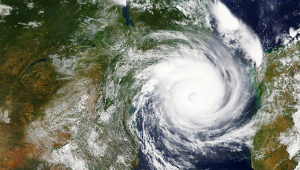The cyclone, one of the worst on record in Africa and the southern hemisphere swept across Mozambique, Malawi and Zimbabwe last month, killing at least a thousand people and leaving three million in desperate need of help.
A cholera outbreak followed the storm, with 4,000 confirmed cases and seven fatalities. Damage was estimated to be at least $1bn.
Penny Mordaunt, international development secretary, said that £10m of the aid funding would be used to meet humanitarian needs, including water and sanitation, food and road repair, to help increase access to the worst affected areas. Another £4m will be allocated to UNICEF’s Education Cannot Wait, a global fund for education in emergencies and protracted crises.
A team of British health workers in the region is working alongside the World Health Organisation in Mozambique, to reduce the risk of cholera. The UK’s Disasters Emergency Committee appeal has also raised £29m, paying for temporary accommodation, purification cubes, blankets and solar lanterns and food.
Mourdaunt announced the UK assistance during a World Bank meeting which discussed the response to the cyclone, encouraging other donors to increase their funding. She stressed the need to help African countries become more resilient to climate change.
She said that African nations were responsible for just 2% to 3% of global emissions, but that the continent was set to be worst impacted by climate change.
She commented: “The UK is leading the way in helping African communities adapt to climate shocks, but climate change is a global issue. We must act worldwide to deal with future extreme weather events. If we don’t the consequences could be devastating.”
As well as funding the immediate cyclone relief effort, the UK has already committed to spend £5.8bn to help developing countries respond to the challenges of climate change up to 2021. The funding will contribute to making agriculture more resilient and improving access to clean energy.













